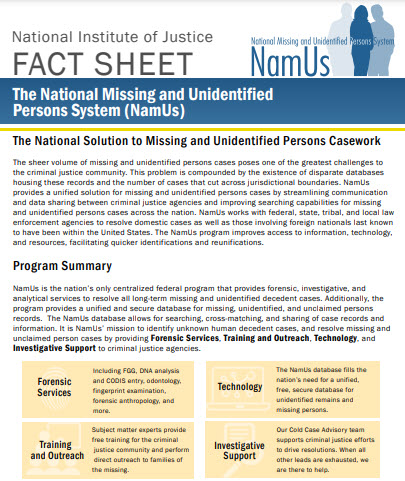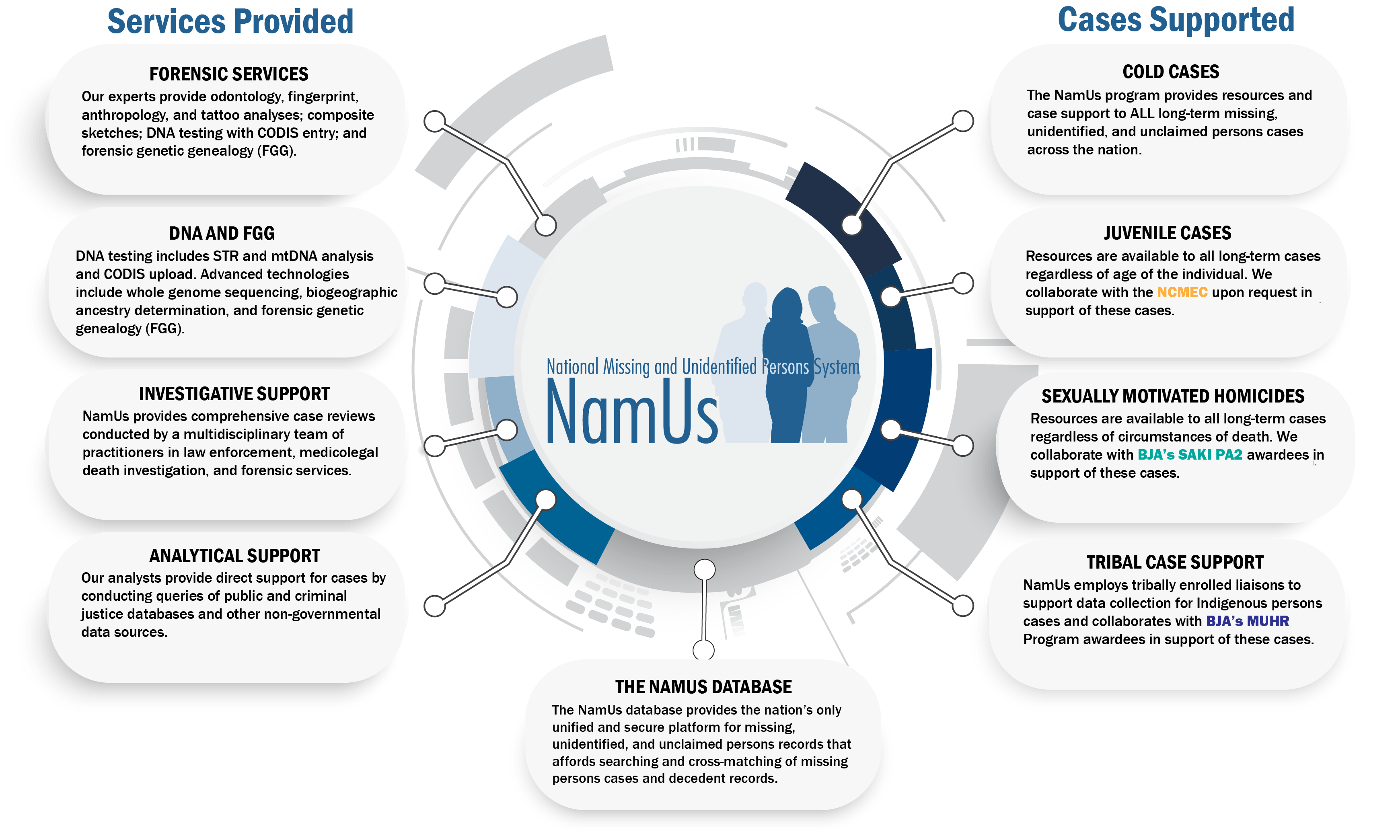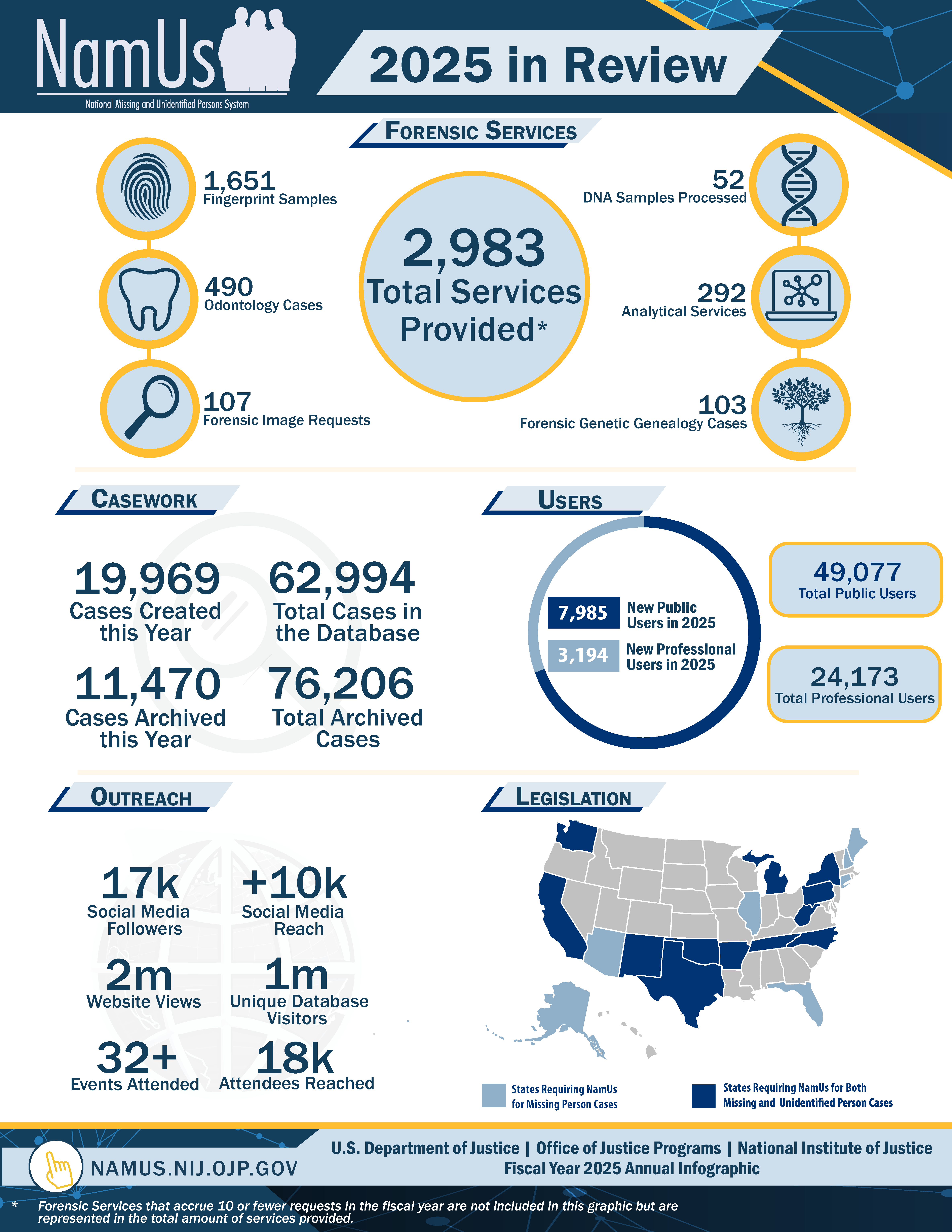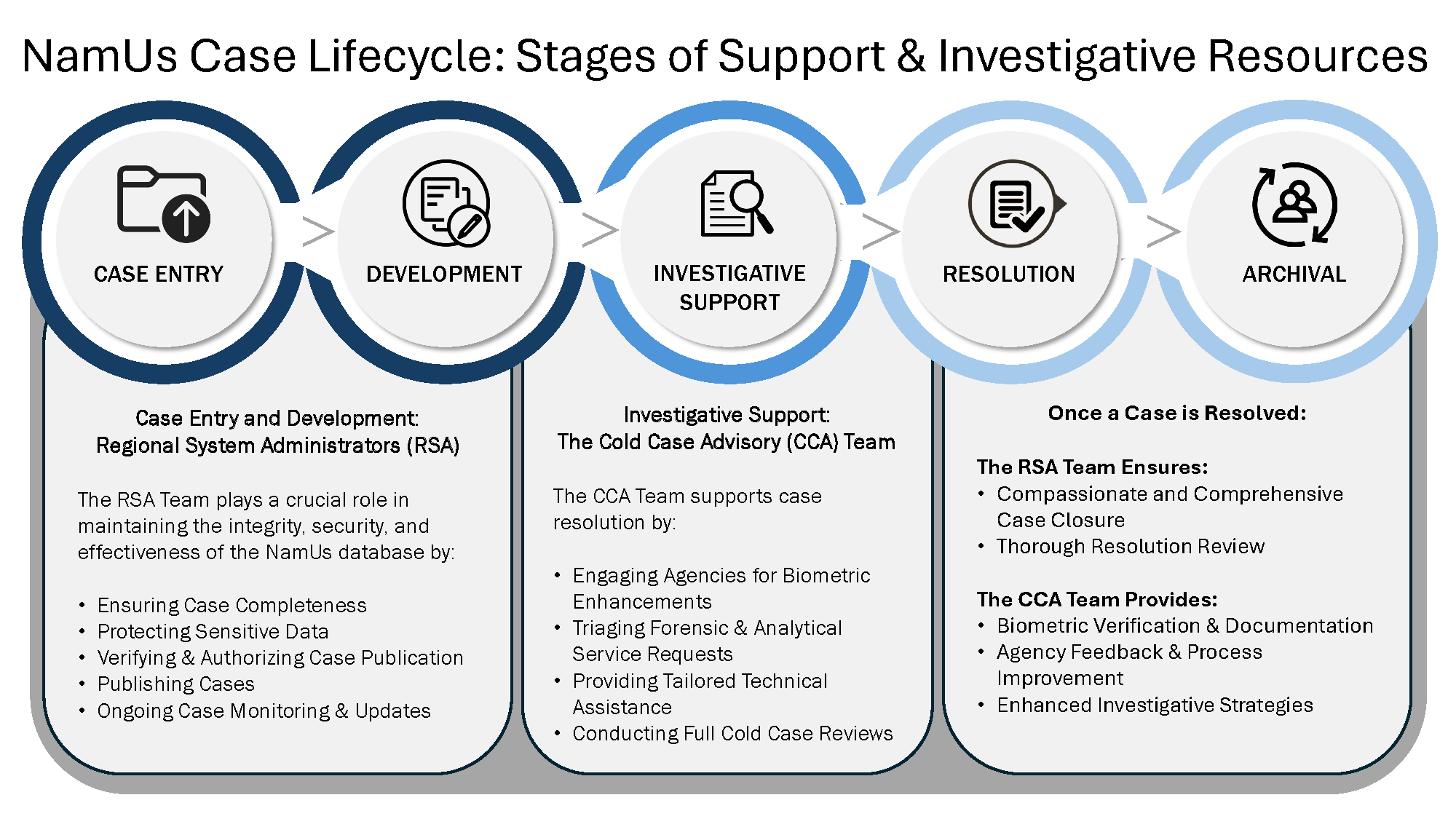See the YouTube Terms of Service and Google Privacy Policy
The History of NamUs
In 2003, the National Institute of Justice (NIJ) began funding major efforts to maximize the use of DNA technology in our criminal justice system, including in the investigation of missing and unidentified person cases. By 2005, NIJ expanded its efforts with the “Identifying the Missing Summit,” where criminal justice practitioners, forensic scientists, policymakers, and victim advocates defined major challenges in investigating and solving missing and unidentified decedent cases. As a result of that summit, the Deputy Attorney General created the National Missing Persons Task Force, which identified the need to improve access to information that would help solve missing and unidentified persons cases. The National Missing and Unidentified Persons System (NamUs) was created to meet that need.
What is NamUs?
NamUs is the only national repository for missing, unidentified, and unclaimed persons cases. The program provides a singular resource hub for law enforcement, medical examiners, coroners, and investigating professionals. It is the only national database for missing, unidentified, and unclaimed persons that allows limited access to the public, empowering family members to take a more proactive role in the search for their missing loved ones.
By bringing together the law enforcement and medical examiner/coroner communities, NamUs facilitates communication and data sharing between them and the criminal justice agencies working these cases. The NamUs program facilitates communication and data sharing between allied forensic professionals while providing an effective tool that allows for the searching and crossmatching of missing persons cases and unidentified human remains records.
Although other programs exist that may provide specific services for subsets of these cases, NamUs is the nation’s only centralized federal program that offers free forensic, investigative, and analytical services to resolve all long-term missing and unidentified cases.
Although NamUs resources primarily benefit cases that have failed to generate an investigative lead after 180 days, we encourage use of this national program for any case whenever circumstances indicate that there is an immediate risk of death or injury. NamUs is the hub that can be used to liaise with other programs and federal initiatives involved in the resolution of long-term missing and unidentified persons cases. 0
Services Provided
Forensic Services
NamUs forensic service offerings include odontology charting and comparison, fingerprint examination and comparison, anthropology, tattoo image enhancement and searching, composite sketches, traditional DNA testing, and investigative genetic genealogy. Our forensic service providers are experts in their respective fields and maintain updated certifications to ensure the highest quality results.
DNA and Genetic Intelligence Services
NamUs offers traditional DNA testing, including short tandem repeat (STR), Y-STR, and mitochondrial DNA (mtDNA) analyses for missing and unidentified persons cases. NamUs subcontracts with accredited, NDIS-participating laboratories to allow for CODIS upload. Additionally, NamUs provides advanced genetic technologies, including biogeographic ancestry determination and whole genome sequencing coupled with forensic genetic genealogy.
NamUs is the longest-standing federal program promoting use of advanced DNA techniques for missing and unidentified persons cases. In support of these efforts, NamUs works with leading industry experts in the field who specialize in degraded evidence and bone samples, kinship testing, and STR and mitochondrial DNA analysis. This enables NamUs to generate genetic information needed for comparisons, database searching, and investigative genealogy to resolve missing and unidentified persons casework.
Investigative Support
NamUs provides comprehensive case reviews and assessments conducted by a multidisciplinary team consisting of law enforcement professionals, medicolegal death investigators, analysts, and forensic scientists. The investigative support team works to provide agencies with solutions for resolving long-term missing, unidentified, and unclaimed persons cases. The program works closely with the Federal Bureau of Investigation, U.S. Customs and Border Protection, the Department of Homeland Security, the Department of Veterans Affairs, the Bureau of Indian Affairs Missing and Murdered Unit, the National Archives, and other federal agencies to provide additional case leads. Lastly, NamUs can serve as a liaison to international and non-governmental organizations to help resolve cases that may involve other countries.
Analytical Support
NamUs provides direct analytical support for missing, unidentified, and unclaimed cases by conducting queries of both public and criminal justice databases, as well as other non-governmental data sources. The NamUs analytical team can provide indications of life for persons reported missing, family member contact information for case inquiries, DNA collections for missing persons cases, or next of kin notifications.
Cases Supported
Long-term Missing, Unidentified, & Unclaimed Persons Cases
The NamUs program provides resources to support all long-term missing, unidentified, and unclaimed persons cases across the nation, regardless of age, racial or ethnic affiliation, or biological sex. NamUs resources can also be used for missing migrants and foreign nationals whose last known location may have been within the United States.
Juvenile Cases
The NamUs database and its resources are available to support all long-term missing, unidentified, and unclaimed persons cases regardless of age. For juvenile cases, NamUs collaborates with the National Center for Missing & Exploited Children (NCMEC) , an organization that provides additional support and resources for all missing, exploited, or recovered juveniles when approved by investigating agencies.
Sexually Motivated Homicides
The NamUs database and its resources are available to support all long-term missing and unidentified persons cases, regardless of circumstances of death. To maximize efficiencies between federal databases, NamUs employs a liaison to coordinate with the FBI’s Violent Criminal Apprehension Program (ViCAP) and the National Crime Information Center (NCIC) to ensure case data is recorded and concordant in all federal repositories.
For sexually motivated homicides, NamUs collaborates with the Bureau of Justice Assistance (BJA) Sexual Assault Kit Initiative (SAKI) program . The SAKI program’s Purpose Area 2 specifically supports the facilitation of nationwide DNA support for sexually motivated homicide victims that are entered into the NamUs database. NamUs staff and SAKI Purpose Area 2 awardees work together to determine how to best utilize federal resources to resolve these cases.
Tribal Case Support
NamUs captures information specific to tribal communities and employs tribally enrolled liaisons to support data collection, information sharing, training, and case assistance for missing or murdered indigenous persons cases. To determine how to best use federal resources to resolve these cases, NamUs collaborates with the Bureau of Justice Assistance (BJA) Missing and Unidentified Human Remains (MUHR) Program awardees. Awardees within this program facilitate nationwide forensic support for tribally affiliated missing and unidentified persons cases that have been entered into the NamUs database.
Technology
The sheer volume of missing and unidentified persons cases in the United States continues to challenge criminal investigative agencies at the local, state, and federal level. This challenge is exacerbated by the existence of disparate, isolated databases housing these records and the fact that many cases cut across jurisdictional boundaries. NamUs addresses these issues by providing the nation’s only unified and secure database for missing, unidentified, and unclaimed persons records.
The NamUs staff utilize the database to facilitate communication between law enforcement agencies, coroners/medical examiner offices, and the families of the missing.
While the staff work to support agencies and improve inter-jurisdictional communication, the database itself provides all users with advanced geospatial and Boolean searching capabilities for cases across the nation, including those involving migrants and foreign nationals last known to have been within the United States. The database is maintained within the Office of Justice Program’s SecureCloud environment, which creates a safe platform for the sensitive data housed in NamUs. Additionally, NamUs is the only federal database that provides limited access to the public, empowering the families of the missing to assist in search and recovery efforts.
Additional Resources
U.S. Customs and Border Protection
The Missing Migrant Program (MMP) seeks to prevent the loss of life amongst the migrant population traversing through the southern border, in accordance with the Missing Persons and Unidentified Remains Act of 2019.
Operation Identify Me is a public appeal to identify 22 women, believed to have been murdered in Belgium, Germany and the Netherlands. Most are cold cases for women who died 10, 20, 30 or even 40 years ago.
Access and share a brochure on Interpol's Missing Persons Unit.
The U.S. Department of Justice is committed to addressing the persistent violence endured by Native American families and communities across the country, which includes working with tribal nations to address the missing or murdered Indigenous persons crisis.
State and Local Grant Programs that Support Identifying Human Remains
BJA’s Missing and Unidentified Human Remains (MUHR) Program
BJA’s Missing and Unidentified Human Remains (MUHR) Program provides funds to eligible entities to improve the reporting, transportation, forensic testing, and identification of missing persons.
BJA’s Sexual Assault Kit Initiative (SAKI) Program
The SAKI program’s Purpose Area 2 specifically supports the facilitation of nationwide DNA support for sexually motivated homicide victims that are entered into the NamUs database. NamUs staff and SAKI Purpose Area 2 awardees work together to determine how to best utilize federal resources to resolve these cases.
Other Resources
FBI's Kidnapping and Missing Persons Investigations
Law enforcement authorities are looking for information that may lead to the location of these individuals.
Tribal Justice and Safety Missing or Murdered Indigenous Persons
Department law enforcement components working with tribal nations to address the important issues of missing or murdered indigenous persons.
Violent Criminal Apprehension Program (ViCAP)
Lists missing persons and unidentified persons who may be victims of foul play.





